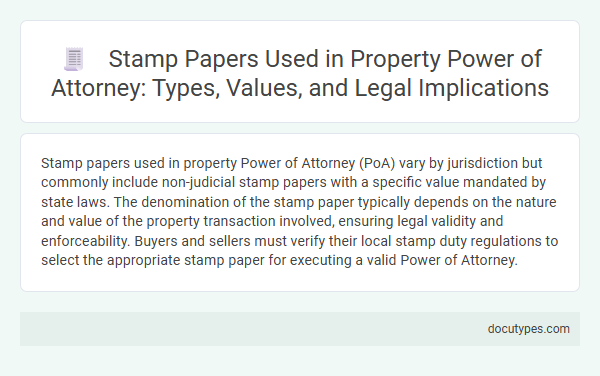Stamp papers used in property Power of Attorney (PoA) vary by jurisdiction but commonly include non-judicial stamp papers with a specific value mandated by state laws. The denomination of the stamp paper typically depends on the nature and value of the property transaction involved, ensuring legal validity and enforceability. Buyers and sellers must verify their local stamp duty regulations to select the appropriate stamp paper for executing a valid Power of Attorney.
Introduction to Stamp Papers in Property Power of Attorney
Stamp papers play a crucial role in the legal validation of property power of attorney documents. Different types of stamp papers are used depending on the property value and state regulations. Understanding the appropriate stamp paper ensures that your power of attorney is legally recognized and enforceable.
Importance of Stamp Papers in Legal Documentation
Stamp papers play a crucial role in validating property Power of Attorney documents, ensuring they are legally recognized. Choosing the correct type of stamp paper directly impacts the enforceability of your legal agreements.
- Non-Judicial Stamp Paper - Used predominantly for property Power of Attorney to authenticate agreements and prevent fraud.
- Judicial Stamp Paper - Utilized specifically in court-related cases, though rarely applied in standard property transactions.
- Fixed Stamp Paper Value - The value varies according to state regulations, reflecting the transaction type and property value for proper documentation.
Types of Stamp Papers Used for Power of Attorney
What types of stamp papers are used for property Power of Attorney? The primary types include non-judicial stamp papers, which vary in value depending on state laws. These papers validate the legal authenticity of the Power of Attorney document in property transactions.
Are there specific stamp paper values required for property Power of Attorney? Stamp paper values typically range from Rs. 100 to Rs. 500 or more, determined by the property location and transaction type. Using the correct stamp paper ensures the document's enforceability in legal proceedings.
State-Wise Variations in Stamp Paper Requirements
Stamp paper types for property Power of Attorney vary significantly across Indian states, reflecting diverse legal frameworks and stamp duty regulations. Commonly, non-judicial stamp papers with values ranging from Rs. 100 to Rs. 1000 are used, depending on the property's location and transaction value. Your choice of stamp paper must comply with state-specific guidelines to ensure the document's legal validity and acceptance.
Determining the Value of Stamp Papers for Property Transactions
Stamp papers are essential for executing a Property Power of Attorney to ensure the document's legal validity. The value of the stamp paper depends on the property's location and transaction specifics.
- Non-Judicial Stamp Paper - Commonly used for property agreements, including Power of Attorney, with values varying by state laws.
- Indian Stamp Act Compliance - The stamp paper value must comply with the Indian Stamp Act and state-specific amendments.
- Market Value Assessment - Stamp duty is often calculated based on the property's market value or transaction amount to prevent undervaluation.
Your Power of Attorney for property must be executed on the appropriate stamp paper value as mandated by local regulations to remain legally enforceable.
Procedure for Procuring Stamp Papers for Power of Attorney
Stamp papers for property Power of Attorney (PoA) typically include non-judicial stamp papers of varying denominations based on the property's value and the state regulations. Common types are adhesive stamp paper and printed non-judicial stamp paper, specifically used to validate legal documents related to property transactions.
The procedure for procuring stamp papers for Power of Attorney begins with determining the required stamp duty according to your state's Stamp Act and the property value. You must then visit an authorized vendor or the official government e-stamp portal to purchase the appropriate stamp paper. Once acquired, the document on the stamp paper must be signed, witnessed, and, in many cases, notarized to ensure legal validity.
Legal Validity and Implications of Stamped Power of Attorney
Stamp papers used in property Power of Attorney primarily include non-judicial stamp papers with values varying by state regulations. The correct denomination ensures the document's legal authenticity and acceptability in property transactions.
Legal validity of a stamped Power of Attorney depends on adherence to prescribed stamp duty rates, preventing disputes in ownership or rights transfer. Improper stamping can lead to penalties, rejection by registration authorities, and challenges in enforcing the Power of Attorney.
Consequences of Using Insufficient or Incorrect Stamp Paper
Stamp papers for property Power of Attorney (POA) typically include non-judicial stamp papers, which vary in value according to state regulations. Common types are Rs. 100, Rs. 200, and higher denominations depending on the property value and state stamp duty laws.
Using insufficient or incorrect stamp paper invalidates the POA, rendering it legally ineffective and subject to penalties. Your transaction may face delays, disputes, or rejection by authorities if the stamp duty is not properly paid, impacting property rights and legal ownership transfer.
Common Mistakes in Executing Stamped Power of Attorney
Stamp papers for property power of attorney vary based on state regulations and transaction value. Understanding the correct type is crucial to avoid legal complications.
- Using Incorrect Stamp Paper - Many execute power of attorney on undervalued or non-judicial stamp papers, invalidating the document.
- Ignoring State-Specific Stamp Laws - Each state mandates specific stamp duty rates and paper types, overlooking which can lead to penalties.
- Failure to Get Proper Attestation - A stamped power of attorney without proper notarization or witness signatures may not hold up in court.
What Types of Stamp Papers Are Used in Property Power of Attorney? Infographic

